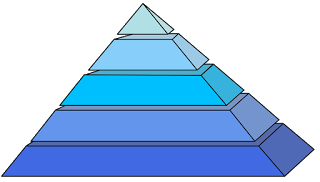Three-Step to Climb the Pyramid of Leadership Profundity
 At the siloed industrial era, leadership efficiency is often dependent on the hierarchical level of authority and brute force style of command and control, it’s often about how loud you can speak or how hard you can push. However, digital means information flow, people centricity, innovation and transparency. Hence, digital leadership must go deeper, to climb the pyramid of leadership profundity and practice the power of pull, and lead more effortlessly.
At the siloed industrial era, leadership efficiency is often dependent on the hierarchical level of authority and brute force style of command and control, it’s often about how loud you can speak or how hard you can push. However, digital means information flow, people centricity, innovation and transparency. Hence, digital leadership must go deeper, to climb the pyramid of leadership profundity and practice the power of pull, and lead more effortlessly.
In-depth knowledge: Knowledge is power! Knowledge is information in use; and it’s information that supports the decision-making process. Knowledge is an expression of understanding relating information and experience accumulated over time, about known facts and past events. The knowledge life cycle is significantly shortened at the digital era, and lots of commodity knowledge are just clicks away, and therefore, knowledge is also the capacity for learning, reasoning, understanding, and similar forms of mental activity; aptitude in grasping truths, relationships, facts, meanings, etc. It means knowledge has to be updated periodically due to the increasing speed of change and digital hyperconnected digital new normal. Learning knowledge is just the first step, at up level, one should connect dots between transdisciplinary disciplinaries and co-create new knowledge. A knowledgeable leader or professional shouldn’t have a “graduated attitude,” to stop learning, or only be interested in providing answers to fulfill egos, in fact, they should learn how to ask open questions and gain collective wisdom. Seeing the big picture into which the knowledge fits.
Cognitive understanding: Knowledge by itself is nothing if you do not understand how to apply it and make it useful. Cognitive understanding means people acquire knowledge through thinking and sensing. When we explore the mental process of acquiring new knowledge through thought, experience, and senses, the cognition involves exploring varieties of meanings/thoughts and abandoning old and establishing new relations. Too often people take the easy path, think and work at a superficial level rather than spend the time to understand what is going on underneath. Insight is an understanding of cause and effect based on identification of relationships and behaviors within a model, context, or scenario. Cognition is a perception, sensation, and insight. And insight is the understanding of a specific cause and effect in a specific context. It enable you to identify the root cause of a problem or the core issues of a situation which leads to cognitive understanding and resolution.
 Multidimensional thinking: The difference between knowledge and wisdom is thinking, and especially lateral, nonlinear or multi-dimensional thinking, a holistic view. Our minds are conditioned based on our own belief systems, education and past happenings. We act based on these unconscious thoughts. Choosing thoughts consciously would be arduous. But it’s the very thoughts decide who you are, the quality of your thinking decides your professionalism and leadership profundity. For example, Critical Thinking is important on how you process information, which is a complex mental activity that encompasses all aspects of one's cognitive styles, and the skills associated with critical thinking include exploring a problem from multiple perspectives, at the deeper level, it has creativity embedded in it. Analyzing the possibilities and projected outcomes provides an opportunity to apply Critical Thinking to the situation, Multidimensional Thinking is a skill that has to be developed through a process, and continuous practices.
Multidimensional thinking: The difference between knowledge and wisdom is thinking, and especially lateral, nonlinear or multi-dimensional thinking, a holistic view. Our minds are conditioned based on our own belief systems, education and past happenings. We act based on these unconscious thoughts. Choosing thoughts consciously would be arduous. But it’s the very thoughts decide who you are, the quality of your thinking decides your professionalism and leadership profundity. For example, Critical Thinking is important on how you process information, which is a complex mental activity that encompasses all aspects of one's cognitive styles, and the skills associated with critical thinking include exploring a problem from multiple perspectives, at the deeper level, it has creativity embedded in it. Analyzing the possibilities and projected outcomes provides an opportunity to apply Critical Thinking to the situation, Multidimensional Thinking is a skill that has to be developed through a process, and continuous practices.
Knowledge is power. Digital leaders and professionals can practice expert power based on their in-depth knowledge, cognitive understanding, and multidimensional thinking skills to enforce the power, and amplify their leadership influence via profundity
Follow us at: @Pearl_Zhu
Published on July 22, 2016 23:46
No comments have been added yet.



